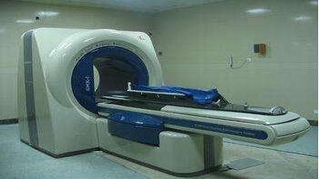
來自賓夕法尼亞大學的科學家在JAMA Oncology雜志上發(fā)表了最新的研究成果,,他們發(fā)現(xiàn),一種可以治療乳腺癌及同內(nèi)分泌療法進行結(jié)合治療的藥物Palbociclib(帕博西尼)或許可以潛在抵御其它類型的癌癥,。Palbociclib可以通過抑制CDK4和CDK6的酶類活性來靶向作用腫瘤細胞的快速分裂,,同時還會促進細胞分裂并且增加癌細胞繁殖的速度,而目前該藥物也是作為首個CDK4/6抑制劑治療乳腺癌的藥物,。
研究人員Amy S. Clark說道,,所有的活細胞都會經(jīng)歷細胞分裂,而Palbociclib可以有效抑制細胞的分裂過程,,而將Palbociclib同其它抗癌療法比如內(nèi)分泌療法,、化療及其它靶向療法結(jié)合就可以對多種類型的癌癥產(chǎn)生一種強大的治療效應(yīng);比如其可以高效抑制黑色素瘤和食管癌中CDK4的效應(yīng),。
靶向療法可以利用多種藥物和其它干預(yù)措施來準確地鑒別并且攻擊癌細胞,同時并不會對正常細胞產(chǎn)生損傷,,Peter J. O'Dwyer博士表示,,除了中性粒細胞外,Palbociclib對正常細胞的效應(yīng)也較小,,而在腫瘤中該藥物可以有效抑制腫瘤的生長,,隨著我們發(fā)現(xiàn)靶點CDK4/6的新功能,我們或?qū)㈤_發(fā)新型的藥物組合來作為新興的抗癌制劑,。
對130項相關(guān)的論文進行分析評估后,,研究人員發(fā)現(xiàn),藥物Palbociclib除了可以幫助有效安全地抵御特定類型的乳腺癌外,,該藥物的早期臨床試驗結(jié)果還揭示了其對淋巴瘤,、肉瘤,、畸胎瘤等腫瘤的效力。隨后研究者對17名患外套細胞淋巴瘤的患者進行2期臨床試驗,,結(jié)果發(fā)現(xiàn),,Palbociclib會產(chǎn)生一種完全的反應(yīng)和兩種部分的效應(yīng),盡管患者的中位無進展生存期僅為4個月,,而其中5位患者的生存期超過了1年,;另一項對29名肉瘤患者的2期臨床試驗結(jié)果表明,藥物Palbociclib可以使得66%的患者的中位無進展生存期達到12周,。
研究者表示,,將Palbociclib同其它抗癌制劑相結(jié)合是可行的,而且對骨髓瘤和其它實體瘤的早期試驗結(jié)果發(fā)現(xiàn)組合療法或許可以帶來較好的療效,。在乳腺癌和其它癌癥的臨床試驗中,,每日服用一次Palbociclib是安全的,而且該藥物的主要副作用可以對嗜中性白血球減少癥進行逆轉(zhuǎn),,嗜中性白血球減少癥即中性白細胞數(shù)量異常性降低,,該細胞數(shù)量的減少會使得患者對感染性疾病更加易感,患者出現(xiàn)的其它副作用還包括疲勞,、惡心,、腹瀉、便秘等,。

doi:10.1001/jamaoncol.2015.4701
PMC:
PMID:
Palbociclib (PD0332991)-a Selective and Potent Cyclin-Dependent Kinase Inhibitor: A Review of Pharmacodynamics and Clinical Development.
Clark AS1, Karasic TB2, DeMichele A3, Vaughn DJ1, O'Hara M1, Perini R4, Zhang P5, Lal P5, Feldman M5, Gallagher M6, O'Dwyer PJ1.
importANCE: Palbociclib (PD0332991) is a newly developed drug that received breakthrough designation and recent US Food and Drug Administration approval in combination with endocrine therapy in the treatment of hormone receptor positive, ERBB2-negative (formerly HER2 or HER2/neu) breast cancer in the first-line metastatic setting. OBJECTIVE: Herein we describe the preclinical and translational data and early- and late-phase clinical trials in which palbociclib has been investigated in a broad array of tumor types. We discuss the pharmacodynamics, pharmacokinetics, toxic effects, and clinical response rates. EVIDENCE REVIEW: On March 1, 2015, we conducted a review of the literature describing the development of palbociclib. We used the PubMed search terms "PD0332991," "palbociclib," and "CDK4/6 inhibitor" to find all published articles of interest, without limitation as to publication date. FINDINGS: Palbociclib is a potent and specific oral cyclin-dependent kinase (CDK) 4/6 inhibitor that has strong preclinical data to support its activity in retinoblastoma protein-expressing tumors. Phase 1 trials have demonstrated safety, and phase 2 trials have shown single-agent activity in mantle-cell lymphoma, breast cancer, liposarcoma, and teratoma with reversible neutropenia as the main toxic effect. Addition of palbociclib to endocrine therapy improves progression-free survival in endocrine therapy-nave and endocrine therapy-resistant metastatic settings. ConCLUSIONS AND RELEVANCE: Palbociclib is well tolerated and has therapeutic potential for multiple cancers, including breast cancer, where its efficacy has been demonstrated alone and in combination with endocrine therapy. Additional combinations of palbociclib with endocrine therapy, chemotherapy, and targeted therapy have potential in various tumors, and phase 3 trials are under way.







